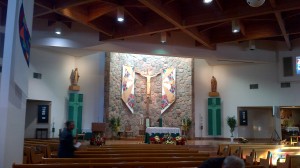 Yesterday I visited the third and final Catholic church in Barrie. Liturgically it was very similar to the others, of course, although I did notice that unlike the other churches, as St. John Vianney they give both bread and wine at communion.
Yesterday I visited the third and final Catholic church in Barrie. Liturgically it was very similar to the others, of course, although I did notice that unlike the other churches, as St. John Vianney they give both bread and wine at communion.
I also finally had the chance to sit down with a priest after the service and talk a bit about the church. This is the first chance I’ve had to talk to an ‘official’ representative of the catholic church.
I have a lot of questions I’d love to ask the entire Catholic hierarchy, not least ‘how can we patch up the appalling mess that we all made during the Reformation, and while we’re at it, the Great Schism as well, and get on with this whole Kingdom of God business?’
However, my time was limited. So I stuck to my usual questions: “why are you here,” and “what is God doing in the city?” And I got probably the most comprehensive answers I’ve yet heard.
The priest talked to me about the church being a place where people are both drawn in to worship God, and then inspired to go outwards and serve the poor and the needy. God, he said, works through people, and he calls each of us to serve others.
Within the formal structure of the Catholic Church in Barrie, there are various organisations such as the Society of St Vincent de Paul, the Knights of Columbus, and the Catholic Women’s League that provide specific opportunities for individuals to serve the poor and demonstrate Christ’s love. And St. John Vianney tries to pool its resources with the other churches in the city to more effectively have an impact on society.
All this I deeply respect, of course. But I still find the lack of communion between Catholics and other denominations deeply troubling. In answer to my inquiries the priest told me that yes, I really did have to pick one side of the fence or the other. If you want to take communion in a Catholic church then you have to first take Catholic baptism, and having done so you would not be allowed to share in the Eucharist at another church.
As I’ve said before, I’m a passionate believer in open communion. I don’t want to have to pick sides in a fight that happened centuries before I was born. I want to be able to eat, pray, and worship alongside my brothers and sisters from across the Christian spectrum. And it saddens me that there are still ecclesiastical rules that forbid me from doing this.
I will say that I felt listened to and respected as I talked about this yesterday. We may struggle with a great deal of historical baggage, but I am grateful every time I encounter someone who shares my desire to bridge the gaps that divide us.